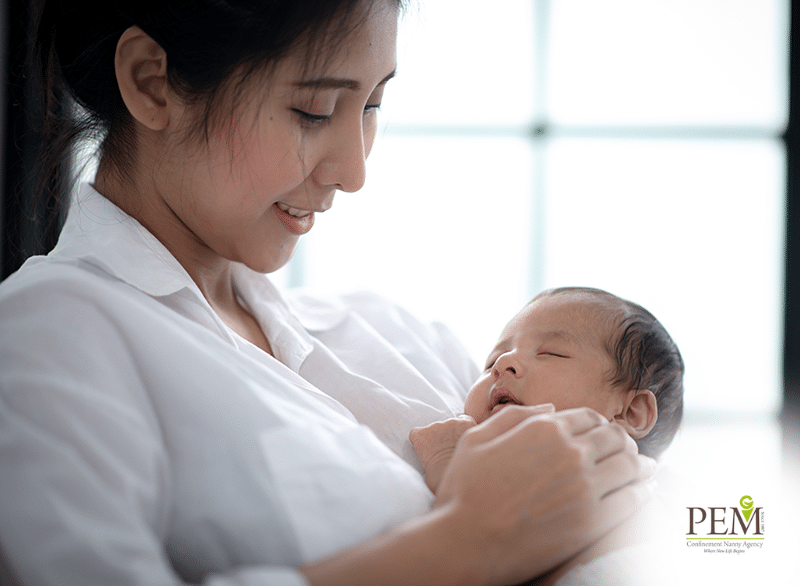Confinement: What Should Be
On My To-do List?

Confinement – the period after giving birth that mothers take to recuperate and recover from the journey of pregnancy and childbirth. We all know what it is. But sometimes, knowing is not enough. For mothers who don’t have the experience of doing confinement at home, it is normal to feel lost about what you and your newborn need, even more so for new parents who are unable to get the support of their experienced family members due to the pandemic.
Hence, we have compiled a few important things for you to prepare for confinement.
Get help with taking care of your newborn
Newborns need a lot of attention and care during their first few weeks of birth, e.g.: feeding, bathing, changing diapers, sleeping, and paying attention to the newborn’s health and wellbeing. With your body still under recovery, it will be much more reassuring to have someone experienced to take care of your newborn and guide you along the way. Which is why having a confinement nanny in Singapore that is trained in taking care of a newborn, and providing nutritious food and guidance in newborn care, like those from PEM Confinement Nanny Agency in Singapore, would be an absolutely fulfilling experience as you will be able to learn about caring for your infant while getting the proper care and food you need.
Plan nutritious meals for postpartum recovery
Having well-balanced and nutritious meals during confinement is important to support your postpartum recovery. Not only will food provide you the nourishment you need to recover, but it will also give you the energy you need to take care of your baby and support you in breastfeeding. Examples of food ingredients that are beneficial for mothers during confinement include chicken, fish, pork, offals, leafy greens, ginger, garlic, red dates, beans, and Chinese herbs. Most traditional Chinese confinement dishes include these ingredients, and usually a confinement nanny in Singapore would be able to cook you these.
Get guidance on breastfeeding and pumping

Some mothers say breastfeeding is the hardest part of postpartum, and we can understand why! On one hand, mothers are likely to face challenges like breast engorgement and low milk supply. On the other hand, learning how to breastfeed, finding the best position to get the baby to latch on, learning how to pump, storing breast milk, and cleaning the tools after pumping is another set of challenges itself! Hence, it is advisable to have someone experienced to guide you when facing any challenges during your confinement.
Pay attention to personal hygiene and rest time
Taking care of personal hygiene is of extreme importance as after giving birth, mothers have wounds whereas babies’ immune systems are still developing. Making sure to take baths and change into new clothes frequently while keeping wounds clean will help with a mother’s recovery. This reduces the risk of developing fungal or bacterial infections, and the likelihood of passing it on to the baby upon contact, from the dirt and bad bacteria accumulated on the skin from going too long without cleaning oneself.
For a further boost in postpartum recovery, having confinement herbal baths is traditionally believed to help as the herbs aid in expelling wind, improving blood circulation, reducing after-birth pain, and being an overall soothing and comforting experience. However, that’s not all. Taking care of your physical health is not all there is to postpartum recovery. Mental health is important too, so make sure to get good quality rest and sleep as a lack of sleep can result in decreased mood and alertness, and slow recovery.
Prepare Your Family for the Future

Usually discarded after birth, the umbilical cord contains a rich source of stem cells that can multiply and differentiate into other blood cells to regenerate and replenish the immune system.
Being drawn from your baby’s own umbilical cord, these cord blood stem cells will be a perfect match for the baby. This eliminates the difficulties of finding a compatible donor should the need for treatment arises, avoiding any potential disease progression.Cord Blood Stem Cells are used around the world to treat over 80 diseases1 including Bone Marrow Disorders, Leukemias and Lymphomas, Blood Cancers, and other auto-immune diseases.
Your baby’s Cord Blood is a proven and powerful medical resource. Don’t miss this opportunity to take up this form of biological insurance for your baby to safeguard the future. Discover more with StemCord, your trusted cord blood bank.
And if you’re looking for trusted and experienced help during confinement, learn more about PEM’s confinement nanny price and service here today!
Reference1: https://parentsguidecordblood.org/en/diseases

 See more blogs
See more blogs